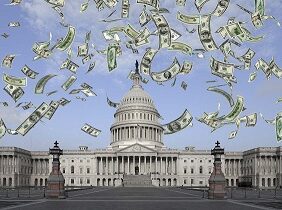It sounded like an innovative and promising idea when President George W. Bush signed the carbon capture and sequestration 45Q tax credit into law 15 years ago. Intended to foster the development and use of beneficial technologies to reduce greenhouse gas emissions from coal-fired power plants, the tax credit was later expanded to reflect a special interest wish list from companies in the ethanol, cement and chemical production industries.
This is how tax credits designed to reduce greenhouse gas emissions ended up being hijacked by special interests to instead inject carbon oxides into the ground in a process called “enhanced oil recovery” to produce more oil and gas from marginal wells. This has transformed a well-intentioned idea into new opportunities for waste, fraud and abuse of taxpayer dollars.
My organization, Taxpayers for Common Sense, conducted a deep analysis titled “Hot Air and High Costs: The Carbon Capture and Sequestration Tax Credit,” highlighting that about $1 billion in distributed 45Q tax credits was pilfered from taxpayers between 2010 and 2019 through insufficient reporting and fraudulent claims.
A tax credit is spending using the tax code where a company or person is rewarded for behavior by filing with the IRS and claiming the tax credit. Congress and the Biden administration can and must investigate who is getting these tax credits fraudulently and impose some transparency on the program. An essential first step toward such transparency — and accountability — would be to maintain a publicly accessible database enabling taxpayers to see who is benefiting from the tax credit’s hundreds of millions of dollars, especially given its history of fraud.
One of the biggest problems with the 45Q program is noncompliance with reporting standards. No reporting has been made public on the amount of carbon being pumped into the ground. The concentration of the use of these tax credits by just a handful of recipients is also a red flag for taxpayers. In April 2020, the Treasury Department’s inspector general for tax administration found that 10 entities claimed over $1 billion in 45Q tax credits from 2010 to 2019, “roughly 99 percent of total credits claimed.” Of the $1 billion claimed, nearly 90% did not comply with Environmental Protection Agency reporting requirements. The companies had insufficiently documented whether the carbon for which they claimed credits remained underground.
<div class=”connatixcontainer”>
Our analysis concluded that the tax credit is “still an unproven climate solution, commercially unviable and mired in its history of tax fraud.” After the 45Q credit was extended for two more years in 2021, the Department of the Treasury estimated the cost of the credit at $20.1 billion from fiscal 2021 through fiscal 2031 — more than double Treasury’s previous estimate. Fast forward to 2022, and Treasury revised the department’s estimate even higher, to $30.6 billion.
These are enormous amounts of money flowing from taxpayers to the pockets of large corporations. Incredibly, Congress further expanded and extended the 45Q credit last year and this massive expansion of the use of the tax credit will likely accelerate the waste and fraud we have witnessed over the past few years.
Our analysis underscored that, out of the 12 commercial carbon capture projects in the United States as of 2020, only one project sequesters captured carbon in an underground sandstone formation, while 11 are capturing and injecting carbon oxides for enhanced oil recovery. Enhanced oil recovery was not the goal of the establishment of the carbon capture tax credit. It is not even certain that the capture of carbon oxides results in a net reduction in the greenhouse gas emissions of concern to the federal government. This failed track record calls into question whether this costly credit should be continued at all.
The Carbon Capture and Sequestration Tax Credit is not capturing or sequestering carbon. To date, this tax credit has been a disaster, capturing a billion taxpayer dollars for sequestration in the bank accounts of about 10 select private companies.
It defies common sense to continue doling out the carbon capture tax credit if it is not resulting in the intended capture of carbon and is clearly an ineffective tool for greenhouse gas capture. Congress and the Biden administration must put the brakes on any ideas to further expand these programs. They must, at a minimum, create some transparency about who is benefiting from these billions of taxpayer dollars.
As tax day approaches (April 18 this year), taxpayers are getting ready to cut checks to the federal government. They should not be subsidizing corporate fraud. The same taxpayers who are searching for receipts and expenses to make sure they are accurate and honest when they file their taxes will be enraged to know that some corporations are gaming the system and receiving big checks they don’t deserve.
</div>











Get Social